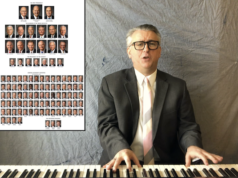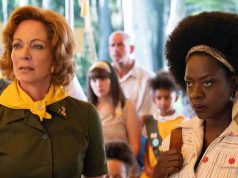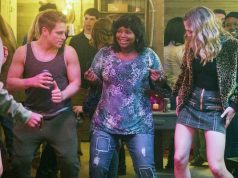There is no reason not to like “Baptists at Our Barbecue,” but there’s no particular reason to like it, either. It’s an amiable film, kind of funny in places, not too irritating when it’s not funny, and it passes the time pleasantly (if blandly). It is the very picture of quiet, modest filmmaking.
Based on the light-hearted novel by Robert Farrell Smith, the film is set in the tiny Southwestern town of Longfellow, renamed “Longwinded” by its citizens. There is an ongoing rivalry here between the Baptists and the Mormons, each denomination having exactly 262 members, with the few residents who belong to neither denomination trying to avoid the crossfire. The mutual disliking seems based more on tradition than doctrine; one suspects the Mormons and Baptists in Longwinded have just always not liked each other, and that no one knows why. (It’s just as well: If they began discussing actual doctrine, they’d probably like each other even less.)
Into this odd little place come two outsiders. One is Tartan Jones (Dan Merkley), a Provo-bred man who, at 29 and unmarried, is tired of the constant matchmaking attempts of which he is the victim. His mother (played delightfully by Jan Broberg Felt) is the worst offender, and while she hardly cares who he marries (as long as he GETS married), she is concerned that he select the right temple for the ceremony: “I just hope you choose the right one,” she says. “Some of them are so boxy.” Tartan is a forest ranger, and when a job opens in Longwinded, he transfers immediately to escape the pressures of living in marriage-happy Provo.
The other newcomer is Charity Hall (Heather Beers), whose fiance just dumped her and who has fled to Longwinded to stay with her aunt while she recuperates. Charity and Tartan meet right away and begin to date — a refreshing surprise, given that most films would try to keep them apart for most of the running time before finally giving in to the inevitable. Their dating is extraordinarily chaste — they don’t even kiss, as far as I can tell — and they seem perfect for each other insofar as both of them are reserved, mild people. I stop just short of calling them “boring,” but I do recall with fondness how vivacious and entertaining Heather Beers was when she played the title role in “Charly” two years ago. Either that was a fluke, or “Baptists” director Christian Vuissa worked hard to tamp her natural enthusiasm down into affable ordinariness.
At any rate, the town has the wacky sorts you expect to find in movies about small towns, as well as the types you find in small LDS communities. Sheriff Bob (Duane Stephens) knows all the ins and outs of everyone’s lives; Sister Wingate (Micaela Nelligan) is the self-righteous wife of the LDS branch president; Orvil (Mike Christian), an Indian who lives in a shack on the outskirts of town; and various old men who sit in front of the general store and provide commentary between naps.
The rivalry between the churches comes to a boiling point when half of the new double-wide trailer that serves as the Mormons’ meetinghouse disappears, with the Baptists being the only logical culprits. Tartan wants to help the faiths look past their differences and come together in friendship, but the missing chapel isn’t going to help much in that regard.
The film is Vuissa’s first feature, though he is no stranger to film, having made the lauded religious short “Roots & Wings” and being the founder of the fast-growing LDS Film Festival. His work is careful and methodical (except for the occasional corpse-whose-eyes-open-and-close situation), and that may be the problem with “Baptists at Our Barbecue.” The humor comes entirely from the dialogue (which Vuissa adapted for the screen with the author and the author’s brother, F. Matthew Smith), and never from the action. Anytime something visual is supposed to be funny, it isn’t. The comedy is over-directed, the sight gags awkwardly staged. You can tell Vuissa had a good idea for a funny image, but couldn’t come up with a logical way of arriving at it.
Two examples come to mind. First, Charity’s ex-fiance shows up at her apartment to apologize, and Charity throws a box of his belongings down at him from the second-story window. There is a shot of the box landing upside-down on the guy’s head, which would be funny, except our subconscious is telling us, “Wait a minute, he’s standing there looking at Charity. He would have seen the box coming and deflected it.” Box on head = funny; box on head illogically ≠ funny.
Later there is a scene where Tartan falls in the mud and is covered in it from head to toe, including his face. Because of this, passersby do not recognize him and he almost gets shot. But wait: If you get mud on your face, you instinctively wipe it off immediately. You certainly don’t walk around like that. Mud on face = funny; mud on face for longer than a couple seconds, used to perpetrate another joke ≠ funny.
Still, as I said, some of the dialogue is funny, and the performances are pleasant. It is a decent entry in the Mormon cinema genre, though I suspect it will not be a very memorable one.
B- (1 hr., 32 min.; )





